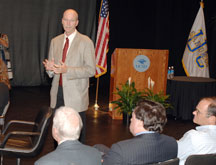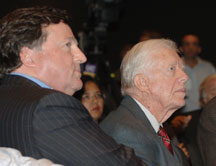

Meeting with Jimmy Carter Energizes Research Team
By Mika Ono
It’s not often that you get to present your work to a former president of the United States, but that’s what a team from The Scripps Research Institute did last month.
The session, in which individuals from the Worm Institute for Research and Medicine (WIRM) at Scripps Research met with President Jimmy Carter and members of The Carter Center, brought together individuals working on parasitic diseases in the lab with those fighting diseases in the field. These parasitic diseases, while rare in the United States, afflict hundreds of millions of people in many other parts of the world with painful, disfiguring, and debilitating conditions.
“President Carter took a keen interest in our work and underlined the huge impact it could have in developing countries,” said Kim Janda, director of the WIRM Institute who is also Ely R. Callaway, Jr. Professor of Chemistry at Scripps Research and a member of its Skaggs Institute for Chemical Biology. “The meeting was a tremendous energizer for our team.”
Janda presented the work of WIRM investigators aimed at laying the scientific foundation for developing efficient and effective diagnostic tools for the parasite that causes onchocerciasis, which according to the World Health Organization affects 18 million people in 35 countries. Onchocerciasis is often referred to as “river blindness” because it occurs in areas close to fast-flowing water where the black flies transmitting the parasite, a tiny worm called Onchocerca volvulus, like to lay their eggs. In severe cases, the worms cause lesions and massive inflammation in the eyes of the infected person, leading to vision problems and blindness.
While river blindness can be effectively treated with the drug ivermectin, which is provided free of charge by its manufacturer, Merck & Co., there is an urgent need to find ways to detect the presence of the adult parasite in the body. A rapid diagnostic test would greatly assist public health efforts to treat and potentially eliminate river blindness as a global health threat.
President Carter outlined the latest work of The Carter Center, a nonprofit, non-governmental organization he founded with his wife, Rosalynn, in 1982 to advance human rights and alleviate unnecessary human suffering. The work of the center, which partners with Emory University, includes multiple health programs targeting developing countries.
Who recognized the potential of such a meeting? None other than John Moores, who chairs the boards of both Scripps Research and The Carter Center.
Moores, a San Diego business leader, philanthropist, and long-time supporter of Scripps Research, launched the WIRM last year with a donation of $4 million. Moores has had a strong interest in river blindness since founding the River Blindness Foundation in 1990. The foundation was formed to distribute the Merck-donated drug, ivermectin, in endemic countries worldwide. In 1995, the River Blindness Foundation merged into The Carter Center.
“I am optimistic that linking the people in the labs with the people in the field can only lead to good things in areas where there is tremendous need,” said Moores. “I am excited about the potential of this partnership between WIRM and The Carter Center, and am hopeful that this effort is the first of many.”
Others present at the gathering included Richard Lerner, president of Scripps Research; Edward Holmes, vice chancellor for health sciences and dean of the School of Medicine at the University of California, San Diego; and WIRM research team members Tobin Dickerson, Lisa Eubanks, Andy Brogan, Junguk Park, Suresh Mahajan, and Mark Hixon.
For more information on WIRM, see http://www.scripps.edu/research/wirm/. For more information on The Carter Center, see http://www.cartercenter.org.
Send comments to: mikaono[at]scripps.edu

Professor Kim Janda explains how researchers at the WIRM Institute are laying the scientific foundation for the development of a rapid field test for river blindness.

John Moores (left), chair of the board of Scripps Research and The Carter Center, and President Jimmy Carter listen attentively.
